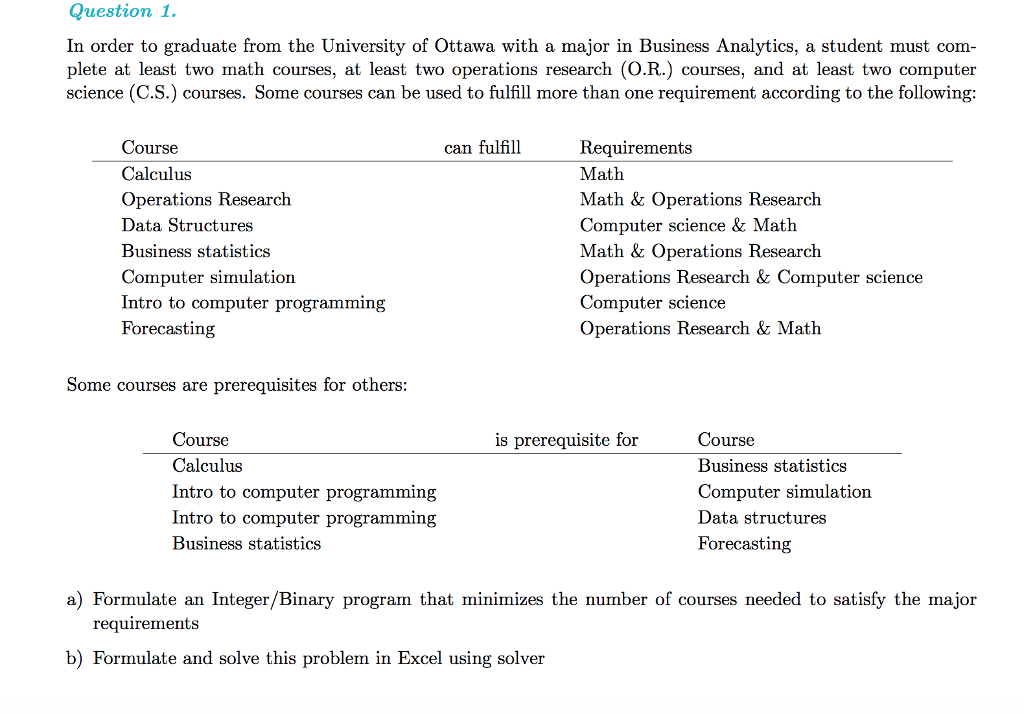

- #OPERATIONAL RESEARCH COURSES REGISTRATION#
- #OPERATIONAL RESEARCH COURSES DOWNLOAD#
If a candidate successfully qualifies for the entrance examinations, he/she can move on to the next round. Results are announced after a few weeks of the exam day. The exam is conducted according to the fixed schedule. Examination (In case of entrance examination):.
#OPERATIONAL RESEARCH COURSES DOWNLOAD#
You need to download and print it out for your entrance examination. Download admit card (In case an entrance exam is conducted by the college):Īdmit cards are released on the official website of the exam conducting body.

You need to pay some application fee online during the submission of the application form. Documents should be uploaded in a specific format specified by the institute’s application portal. You need to upload all required documents like mark sheets.
#OPERATIONAL RESEARCH COURSES REGISTRATION#
(The registration is done on the official websites of the particular college you are applying to)Īfter registration, you need to fill up the application form with all necessary details with care. You need to create an account with basic details like email-id, phone number, etc. Registration dates are announced on the official website of the college around 4-5 weeks before by the institute. Most of the institutes offer admission to the Master of Science (Operational Research) Course, based on the merit list or marks secured in the entrance examination of that particular college.

Auctions, revenue equivalence, optimal auctions.Admission Process M.Sc Operational Research: Admission ProcessĪdmission procedures can vary from one college to another. Existence and computation of Nash equilibria in non-zero sum
Cooperative and non-cooperative games. Exact, approximate, and heuristic methods for the travelling salesman problem. MAX CUT, semidefinite programming, interior point methods. Minimum spanning trees, Prim’s algorithm. Shortest paths, Bellman-Ford algorithm, Dijkstra’s algorithm. Transportation and assignment problems, Ford-Fulkerson algorithm, max-flow/min-cut theorem. Polynomial time algorithms for linear programming. Exponential complexity of the simplex algorithm. Sufficient conditions for convexity of the optimal value function. Taylor: Social Choice and the Mathematics of Manipulation. Moulin: Axioms of Cooperative Decision Making. Barak: Computational Complexity - A Modern Approach. Tsitsiklis: Introduction to Linear Optimization. Sherali: Linear Programming and Network Flows, Wiley (1988).Ģ. Clicking on the title link will show you where the book can be found.ġ. You can find these books in libraries around Cambridge. There will be 3 examples sheets and classes for these, in which I will discuss their solutions. Otherwise, please let me know and I will make the correction.Īfter each lecture I will be writing a few comments in the course blog: to emphasize an idea, answer an interesting question (which perhaps a student sends to me in email or asks in lecture). If you think you find a mistake in the notes, check that you have the most recent copy (in case a correction has already been made). I aim to make each lecture a self-contained unit on a topic, with notes of typically four A4 pages. It will be given M, W, F at 11am in MR14, starting October 9, 2015, and ending December 2. This is the home page for a course of 24 lectures to Cambridge MMath/MASt







 0 kommentar(er)
0 kommentar(er)
